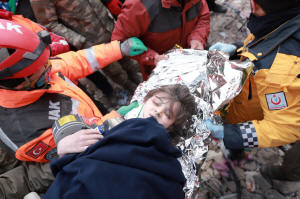Children plucked from ruins days after earthquake, but death tolls tops
21,000
 Send a link to a friend
Send a link to a friend
 [February 10, 2023]
By Mehmet Caliskan, Maya Gebeily and Khalil Ashawi [February 10, 2023]
By Mehmet Caliskan, Maya Gebeily and Khalil Ashawi
ANTAKYA, Turkey/JANDARIS, Syria, (Reuters) -Rescue crews on Friday
pulled a 10-day-old boy and his mother from the ruins of a collapsed
building in Turkey and dug out several people in other sites four days
after a huge earthquake wrought death and destruction across southern
Turkey and northwest Syria.
The confirmed death toll from the deadliest quake in the region in two
decades stood at 21,000 in both countries on Friday.
Hundreds of thousands more people have been left homeless and short of
food in bleak winter conditions, desperate for a multi-national relief
effort to alleviate their suffering.
Syrian President Bashar al-Assad made his first reported trip to
affected areas since the quake, visiting a hospital in Aleppo, state
media reported. But the World Food Programme said it was running out of
stocks in rebel-held northwest Syria.
Turkey's President Tayyip Erdogan was also expected to tour the disaster
zone in his country on Friday amid criticism from survivors and
political opponents that his government's response to the catastrophe
was slow and poorly organised - accusations he rejects as he bids for
re-election in May. That election may now be postponed due to the
disaster.

In the Turkish city of Kahramanmaras, near the quake's epicentre, Friday
prayers echoed over the devastated area, mixing with the din of
extractors and generators powering the rescue operations.
Rescuers, including teams from dozens of countries, toiled through the
night in the ruins of thousands of wrecked buildings. In freezing
temperatures, they regularly called for silence as they listened for any
sound of life from mangled concrete mounds.
In the Samandag district of Turkey's Hatay province on Friday, rescuers
crouched under concrete slabs and whispering "inshallah" (God willing),
carefully reached into the rubble and picked out a 10-day-old newborn.
His eyes wide open, baby Yagiz Ulas was wrapped in a thermal blanket and
carried to a field hospital. Emergency workers also took away his
mother, dazed and pale but conscious on a stretcher, video images
showed.
In Diyarbakir to the east, Sebahat Varli, 32, and her son Serhat were
rescued and taken to hospital on Friday morning, 100 hours after the
quake.
Across the border in Syria, rescuers from the White Helmets group used
their hands to dig though plaster and cement until reaching the bare
foot of a young girl, still wearing pink pajamas, grimy but alive and
free.
But hopes were fading that many more would be found alive.
In the Syrian town of Jandaris, Naser al-Wakaa sobbed as he sat on the
pile of rubble and twisted metal that had been his family's home,
burying his face in the baby clothes that had belonged to one of his
children.
"Bilal, oh Bilal," he wailed, shouting the name of one of his dead
children.
The death toll from the 7.8 magnitude earthquake and several powerful
aftershocks across both countries has surpassed the more than 17,000
killed in 1999 when a similarly powerful earthquake hit northwest
Turkey.
It now ranks as the seventh most deadly natural disaster this century,
ahead of Japan's 2011 tremor and tsunami and approaching the 31,000
killed by a quake in neighbouring Iran in 2003.

[to top of second column]
|

Turkish boy Poyraz is carried to an
ambulance after being rescued alive from rubbles in the aftermath of
a deadly earthquake in Kahramanmaras, Turkey February 10, 2023.
REUTERS/Berkcan Zengin

The death toll in Turkey rose to 18,342 by Friday morning and the
number of injured stood at 74,242, the disaster management authority
AFAD said.
In Syria, more than 3,300 have been killed, though rescuers have
said many more people remain under rubble.
Some 24.4 million people in Syria and Turkey have been affected,
according to Turkish officials and the United Nations, in an area
spanning roughly 450 km (280 miles) from Adana in the west to
Diyarbakir in the east. In Syria, people were killed as far south as
Hama, 250 km from the epicentre.
Many people have set up shelters in supermarket car parks, mosques,
roadsides or amid the ruins. Survivors are often desperate for food,
water and heat, and working toilets are sparse in hard-hit areas.
POLITICAL FALLOUT
The disaster has cast doubt on whether the May 14 Turkish election,
in which Erdogan is facing his toughest challenge in two decades in
power, will go ahead on schedule.
With anger simmering over delays in the delivery of aid and getting
the rescue effort underway, it is likely to play into the vote if it
goes ahead. Erdogan has called for solidarity and condemned what he
has described as "negative campaigns for political interest".
Kemal Kilicdaroglu, head of Turkey's main opposition party,
criticised the government response.
"The earthquake was huge, but what was much bigger than the
earthquake was the lack of coordination, lack of planning and
incompetence," Kilicdaroglu said in a video statement.
DEEP CONCERN OVER NORTHWEST SYRIA
Relief efforts in Syria have been complicated by the 11-year-long
civil war there. Syrians have voiced despair at the slow response
including in areas controlled by Assad, who is shunned by the West.

On Friday, 14 trucks carrying humanitarian aid crossed into northern
Syria from Turkey, the International Organization for Migration in
Geneva said. They carried electric heaters, tents, blankets and
other items.
But the World Food Programme (WFP) said it was running out of stocks
in northwest Syria, where 90% of the population depends on
humanitarian assistance. It called for the opening of more border
crossings from Turkey.
The Syrian government, which is under Western sanctions, has
appealed for U.N. aid while saying all assistance must be done in
coordination with Damascus and delivered from within Syria, not
across the Turkish border.
Damascus views the delivery of aid to rebel-held areas from Turkey
as a violation of its sovereignty.
The presidency shared images of Assad and his wife Asma visiting
people in Aleppo who were injured in the quake.
(Additional reporting by Umit Bektas in Antakya, Orhan Coskun in
Ankara, Ece Toksabay and Huseyin Hayatsever in Adana, Jonathan
Spicer, Daren Butler and Ali Kucukgocmen in Istanbul, Writing by Tom
Perry and Angus MacSwan; Editing by Frank Jack Daniel)
[© 2023 Thomson Reuters. All rights
reserved.]This material may not be published,
broadcast, rewritten or redistributed.
Thompson Reuters is solely responsible for this content. |